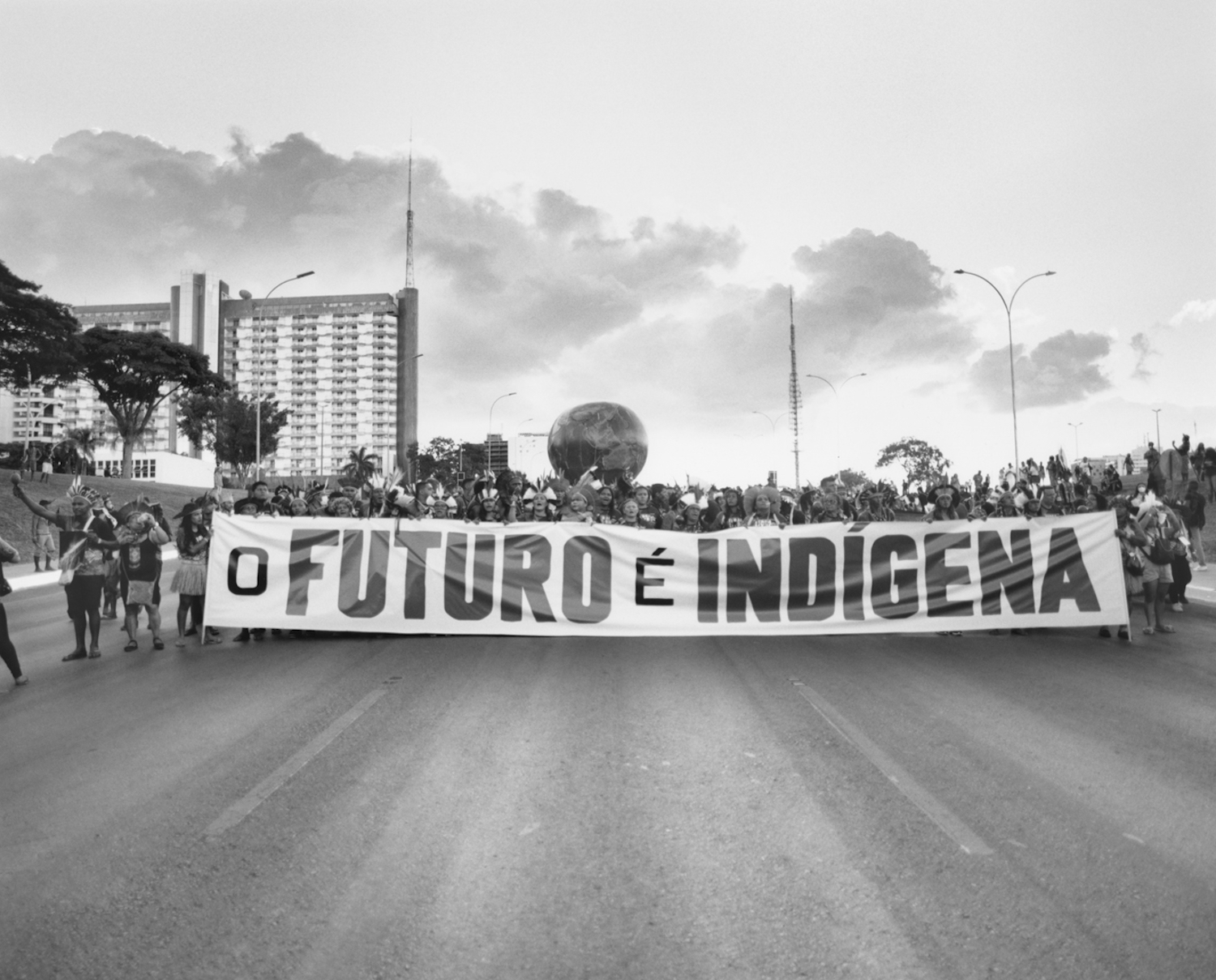Over ten days in April, members of Indigenous communities from across Brazil descended upon Brasília, the nation’s capital, for Acampamento Terra Livre (ATL) – the largest mobilisation of Indigenous peoples that the country had ever seen. Comprising representatives of the 305 Indigenous peoples that live in Brazil, they had come together to protest the grave, existential threats posed to both their lives and the environments they inhabit – and protect – by laws instilled and proposed by the incumbent government, led by Jair Bolsonaro.
During that time, Vava Ribeiro, the esteemed Brazilian photographer, was present. “As a Brazilian, this is a part of my culture and history, and a subject that I really felt compelled to photograph,” he says. “I’ve been following the ATL demonstrations in Brasília for the past couple of years but had never been in Brazil at the same time, and it also didn’t take place in 2020 and 2021 due the pandemic. Given the current environmental and political scenario of the country, attending this year became a priority for me.”
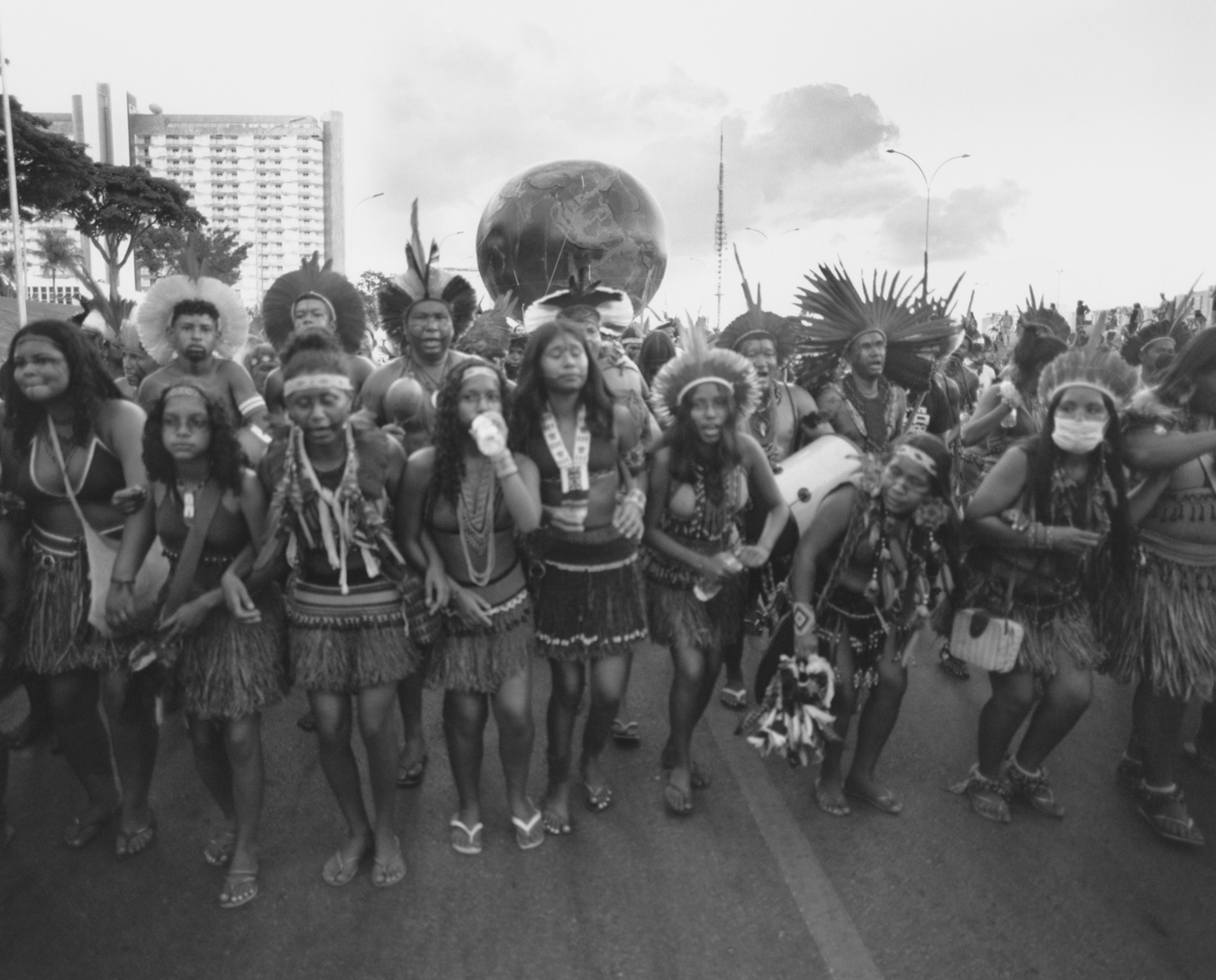
While there, he documented both the events that took place and a selection of the protesters – some of whom had “travelled for weeks by canoe, boat, truck, bus and then by foot, all to come together and fight for their rights,” he explains. Capturing “both the experience of participating in a moment and also a glimpse of connection with the individuals” he photographed, an edit of the resulting images was published in the latest issue of i-D, The Earthrise Issue, alongside a poignant call to action by Indigenous journalist Erisvan Guajajara, the coordinating founder of Mídia Índia, a collective formed by Indigenous people from across different communities and regions. Bringing together images of the marches that took place during the ATL – pictures Vava describes as “very sensorial, more about feeling the energy of that moment, like you are there marching with them” – and powerful portraits of the participating protesters, the ensemble paints a textured, earnest impression those ten days.
Below, accompanying a selection of the images are interviews conducted with three attendees of the protests. Their testaments are a crucial reminder of the urgency of the plight faced by Brazil’s Indigenous peoples, and the need for us all to take action – for their sakes, yes, but also for our own. “It’s a survival case, a cause that we must unite behind,” Vava says.
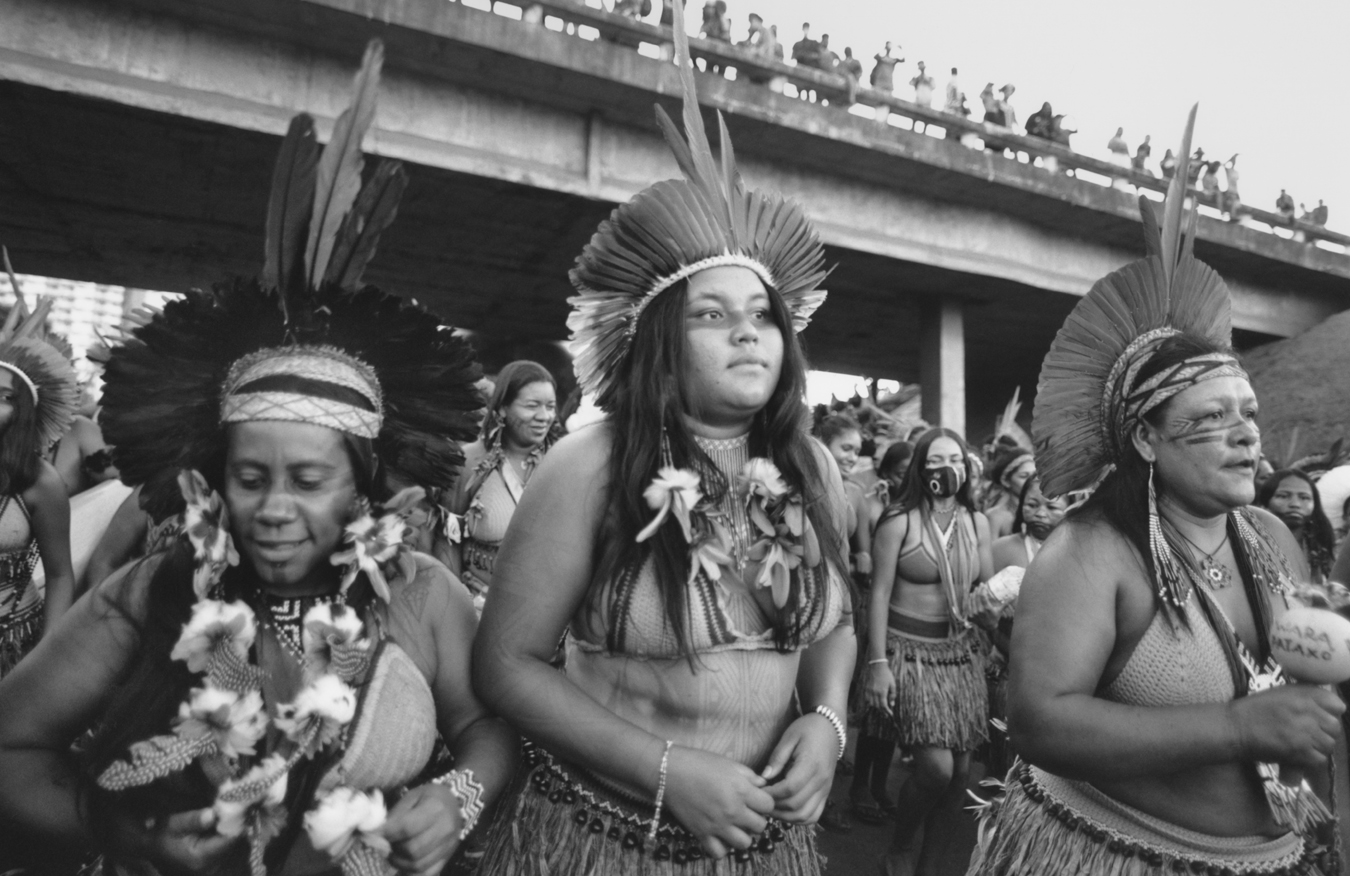
Zaya Ribeiro
What brought you to the protests in Brasília? And tell us about the experience of being there and taking part in them?
My main motivation for joining these demonstrations was to bring my energy, voice and power of representation to this important fight for Mother Nature that concerns every single human on this planet. And this implies reaffirming our rights as Indigenous people, defenders and stewards of territories which will play a crucial role in the survival of humanity in the coming decades.
It brought me considerable honour and pride to be among so many Indigenous leaders whom I consider as my guides and mentors. Through their blessing, they are giving me the strength to be a voice for our cause in Brazil and abroad.
Meeting so many people coming from outside Brazil to defend the Indigenous cause also gave me hope, because this shows the rest of the planet the importance of being united in these critical times and why the entire world should join us in this struggle.
What is your hope for the outcome of these protests?
That people inside and outside Brazil understand the two main things that are at stake here:
Firstly, the right for territorial governance and Indigenous self-determination. These are necessary actions to ensure Indigenous territorial defence, recognition of collective and territorial rights and the construction of life plans to legitimise Indigenous governance.
Secondly, that tremendous actions are urgently needed for a just transition from a socio-economic model based on the extraction of natural resources to a regenerative model that puts the reproduction of life at the centre of its concern.
What actions do you want to see taken, both from the Brazilian government and the global community?
The Brazilian government needs to stop its current actions that are focussed on opening Indigenous land for commercial use and preventing the demarcation of Indigenous lands. Doing so puts the interest of a few industrial groups over the survival of our planet. Leading scientists believe the tipping point will come at 20 to 25 per cent deforestation, causing a large amount of the lush rainforest to turn into dry savanna, risking profound implications for biodiversity, carbon storage and climate change on a global scale.
Foreign governments need to put pressure on the Brazilian government to stop waging war against the Amazon and its people, as they have done in the context of other conflicts around the globe.
At an individual and corporate level, we must encourage the boycott of every company even slightly involved in extracting resources and hit them where it will hurt the most: their financial results.
How would you describe the current threats to the lives of Brazil’s Indigenous peoples?
Indigenous livelihoods and territories are under tremendous pressure, threatened by forest depredation, mining, agribusiness, infrastructure projects and extremist missionaries.
In the little more than three years since Bolsonaro has been in office, there has been a proliferation of invasions, conflicts, illegal mining, and the burning and deforestation of lands with the presence of isolated Indigenous groups. The mass invasion of “garimpeiros” (gold prospectors) onto the Yanomami territory, the timber exploration in the Araribóia territory, and the increased deforestation and land grabbing in the Piripkura, Ituna-Itatá and Uru-Eu-Wau-Wau territories are just some of the most critical situations right now.
Another threat seems to me to be the relative indifference encountered in Brazilian society around these issues. None of the Brazilian mainstream media outlets (whose economic models rely on some of the big companies involved in the exploitation of the land) have covered these protests, which contributes to the lack of awareness of the Brazilian population.
How can people support your cause?
By bringing visibility to our fight, if only through social media, and of course by giving money, resources or time to Indigenous organisations and NGOs operating in these territories in order to reverse the current dynamic.
What is your message to the world?
If you can, please support the Indigenous leaders fighting for the survival of our planet:
Beyond our own destiny as a people, we speak for Mother Nature and for every human on this planet!
@thezaya__

Kurato Waura
What brought you to the protests in Brasília?
Well, what brought me was PL191, a proposed law that poses a great threat to us. It would dramatically harm the natural environments we live in: the rivers that provide us food, the forests that allow us to breathe and where we hunt.
What is your hope for the outcome of these protests?
I hope that our fight yields tangible results and that the nation’s deputies and our current President show us respect.
What actions do you want to see taken, both from the Brazilian government and the global community?
I want the current government to take action to withdraw this needless bill. I want the world to see how extensive our knowledge is when it comes to living in tune with nature, and that Brazil is an Indigenous land.
How would you describe the current threats to the lives of Brazil’s Indigenous peoples?
The government we currently have in place is murderous and genocidal. This incumbent president does not represent me.
What is your message to the world?
I am deeply worried about the future that lies in store for my children. How they will live from without land, a home, or even food? Without Indigenous people, there is no life for any of us. Everything will die: the planet will warm, rivers will dry up, and ice will melt. Save Indigenous people – save nature!
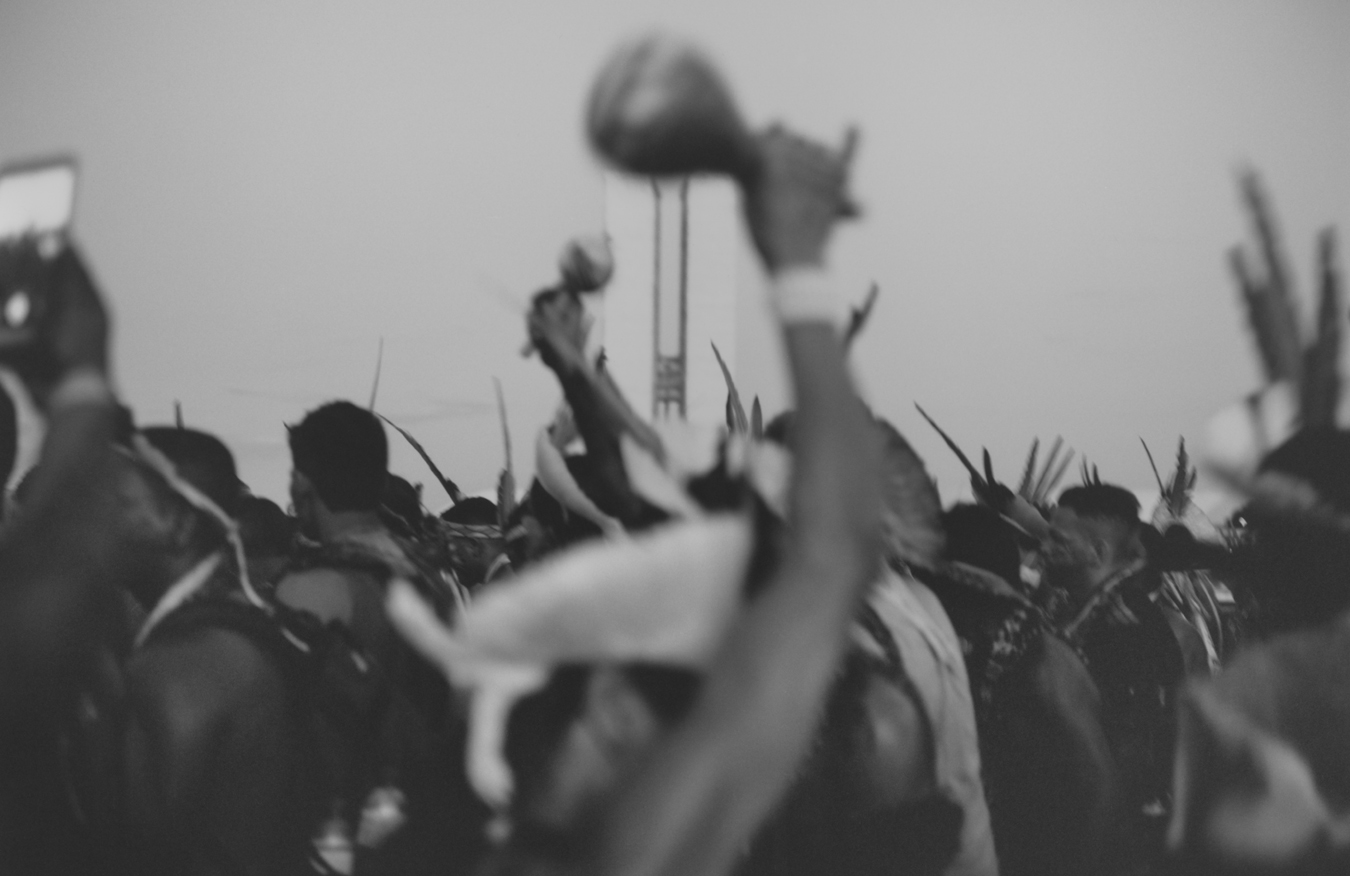
Dayana Molina
What brought you to the protests in Brasília? And tell us about the experience of being there and taking part in them?
Brasília brings together the ministries of Brazil, and it is there that almost everything in our country is decided. Here, historically, there have been political protests in opposition to the government; stage of struggles and processes of resistance. It was a way of demarcating and expressing the strength of Brazil’s Indigenous peoples.
What is your hope for the outcome of these protests?
That we can make civil society aware of the emerging problems we face. That we can pressure the Brazilian government, the primary enemy of Indigenous peoples today. That we can seize media attention and give visibility to our agendas. Through protests like these, we can get more support for our activism.
What actions do you want to see taken, both from the Brazilian government and the global community?
We want our different ways of life to be respected: our culture, our bodies, our sacred territories and our worldviews. The world’s Indigenous population is vital for the protection of the planet. Without our existence, the world cannot sustain itself in a healthy way.
How can people support your cause?
There are many ways to support us. We exist in many different places and facets of society. In my case, I’m a stylist and I use fashion as a fighting tool – when we create conscious, sustainable and political fashion, we are decolonizing people’s minds. The same is true with Indigenous artists who use their music as a form of protest. You can read Indigenous authors that discuss culture and intellectual traditions. There are so many ways to support us. It’s not just limited to going to protests or setting agendas, but there are practical steps people can take to strengthen what we are doing on a daily basis. It improves our lives in every way.
What is your message to the world?
We are the smallest group of people in the world, and yet, we are the ones who play the greatest role in protecting nature. Even if you don’t understand our strength, respect us. Respect our different ways of living and existing. When we sing, we heal the earth. When we pray we embrace nature and she embraces us. We are part of the life that pulsates on this planet. Our love and care are expressed in many ways, but mainly in the act of seeing life as something sacred. To fight together with the Indigenous peoples of this continent is to be part of the most beautiful and important fight of our time.
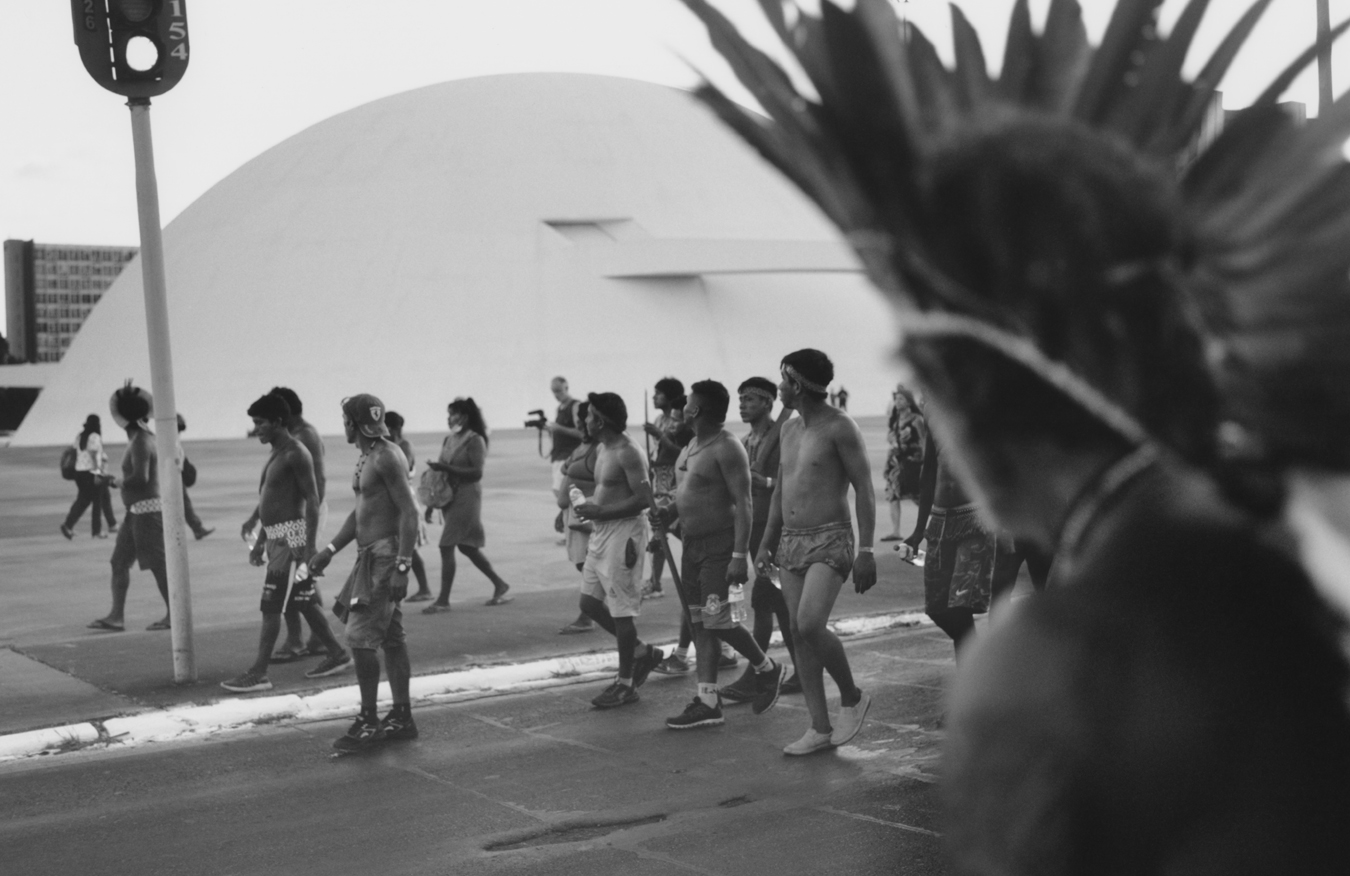
Below, you’ll find a list of organisations you can donate to:
Amazon Watch
Articulação dos Povos Indígenas do Brasil (APIB)
Amigos da Terra
Coordenação das Organizações Indígenas da Amazônia Brasileira (COIAB)
SOS Amazônia
Credits
Photography Vava Ribeiro
Production Marcelo Miranda (Boró)
Black and white prints Jeremy Brenner
Special thanks to the Aymara, Fulni-ô, Guaraní, Kaingang, Kalapalo, Kayapó, Pataxó, Waiapi and other tribes featured in this story
